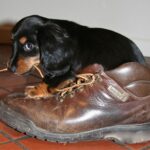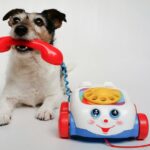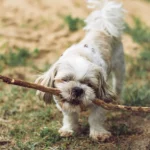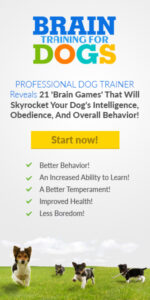How to Keep a Puppy from Chewing: Tips for a Chew-Proof Home
Welcoming a puppy into your home is a joyous experience, filled with playful antics and boundless energy. However, one common challenge many new puppy owners face is managing that inevitable urge to chew. Puppies explore the world with their mouths, and if not guided properly, they can chew on furniture, shoes, or anything they can get their paws on. Fortunately, with the right strategies, you can steer your puppy’s chewing habits in a more desirable direction. Here’s how to keep a puppy from chewing everything in sight and ensure a harmonious living environment for both of you.
playful antics and boundless energy. However, one common challenge many new puppy owners face is managing that inevitable urge to chew. Puppies explore the world with their mouths, and if not guided properly, they can chew on furniture, shoes, or anything they can get their paws on. Fortunately, with the right strategies, you can steer your puppy’s chewing habits in a more desirable direction. Here’s how to keep a puppy from chewing everything in sight and ensure a harmonious living environment for both of you.
1. Provide Plenty of Chew Toys
One of the simplest and most effective ways to curb unwanted chewing is to provide your puppy with a variety of appropriate chew toys. Puppies need to chew to relieve teething discomfort and satisfy their natural instincts. By offering a range of toys—such as rubber kongs, plush toys, and durable chew bones—you can keep them engaged and distracted from your personal belongings.
- Rubber Toys: These are great for puppies who love to chew vigorously. They are durable and often come with treat-dispensing features to keep your pup entertained.
- Plush Toys: Soft and cuddly, these toys are perfect for puppies who enjoy snuggling and gentle chewing.
- Interactive Toys: Toys that dispense treats or make noises can provide mental stimulation and keep your puppy focused on appropriate items.
2. Use Deterring Sprays
 Chewing deterrent sprays are specially formulated to discourage puppies from chewing on non-toy items. These sprays are typically bitter-tasting and unpleasant for dogs, making them a useful tool to protect your belongings.
Chewing deterrent sprays are specially formulated to discourage puppies from chewing on non-toy items. These sprays are typically bitter-tasting and unpleasant for dogs, making them a useful tool to protect your belongings.
- Apply Regularly: Ensure you follow the instructions on the spray bottle, and reapply as needed to maintain its effectiveness.
- Test First: Before applying it to furniture or fabrics, test the spray on a small, inconspicuous area to ensure it doesn’t cause damage.
3. Puppy-Proof Your Home
Puppies are curious and will explore every nook and cranny. By puppy-proofing your home, you can reduce the likelihood of them finding tempting but inappropriate things to chew.
- Keep Items Out of Reach: Store shoes, electrical cords, and other chewable items in cabinets or out of reach.
- Use Baby Gates: Block off areas where you don’t want your puppy to roam freely, thus limiting their access to chew-prone zones.
4. Redirect and Reward
Training plays a crucial role in guiding your puppy’s chewing behavior. When you catch them chewing on something they shouldn’t, gently redirect them to an appropriate chew toy.
When you catch them chewing on something they shouldn’t, gently redirect them to an appropriate chew toy.
- Immediate Redirection: Quickly provide a toy or chew item when you see your puppy chewing on something inappropriate.
- Positive Reinforcement: Praise and reward your puppy when they choose to chew on their toys instead. This reinforces the behavior you want to see and helps them learn which items are acceptable.
5. Exercise and Mental Stimulation
Boredom and excess energy can contribute to destructive chewing. Ensuring your puppy gets ample physical and mental exercise can help alleviate these issues.
- Daily Walks: Regular walks provide physical exercise and mental stimulation.
- Playtime: Engage in interactive games like fetch or tug-of-war to tire out your puppy and keep them occupied.
- Training Sessions: Short, frequent training sessions can provide mental stimulation and reinforce good behavior.
6. Teach “Leave It” and “Drop It” Commands
Training your puppy to respond to commands like “leave it” or “drop it” can be incredibly beneficial in managing their chewing behavior.
- Start with Basic Training: Begin training with simple commands and gradually progress to more complex commands.
- Consistency is Key: Consistent practice and reinforcement will help your puppy learn these commands effectively.
7. Address Underlying Issues
 Sometimes, excessive chewing can be a sign of underlying issues such as anxiety or discomfort. If your puppy’s chewing seems excessive or persistent, it may be worth consulting with a veterinarian or a professional dog trainer to address any potential issues.
Sometimes, excessive chewing can be a sign of underlying issues such as anxiety or discomfort. If your puppy’s chewing seems excessive or persistent, it may be worth consulting with a veterinarian or a professional dog trainer to address any potential issues.
Conclusion
Managing a puppy’s chewing habits requires patience, consistency, and the right tools. By providing appropriate chew toys, using deterrent sprays, puppy-proofing your home, and incorporating training and exercise, you can help your puppy develop good chewing habits and protect your belongings. Remember, chewing is a natural behavior for puppies, and with a little guidance, you can channel it into positive and enjoyable activities. Happy training!
Robert
support@iqquest.info


